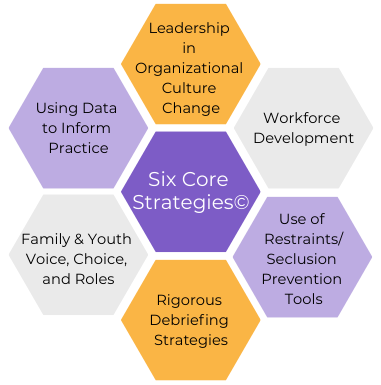
INTRODUCTION
The Six Core Strategies© is an evidence-based practice to prevent violence, trauma, and the use of seclusion, restraint, and other coercive practices. ACRC/BBI is an international initiative to promote partnerships between all residential stakeholders, especially families and youth, and to support the use of program practices and staff skills that align with the research on improving long-term, sustained positive outcomes post-residential discharge for the youth and families served by residential interventions.
The Six Core Strategies© and ACRC interface with their commitment to best practices that align with the research to improve outcomes for youth and families, and with common values, such as family-driven, youth-guided, trauma-informed care, cultural and linguistic competence, and individualized and strength-based approaches.
It is our great hope that this Six Core Strategy© training overview will assist all of us to move closer to a service system that is based on the emerging science of trauma-informed care and is defined by the values of respect, collaboration, best customer service, and true partnerships with those we serve.
Faculty includes the following ACRC/BBI Consultants:

7-Session Training Dates:
Each core strategy session will include key foundational elements for success and real practice applications
All Times 12-1 pm CT | 1-2 pm ET
(There will be an additional 30 minutes of Q & A following, for those who’d like to participate in questions and discussion)
December 2, 2025: Overview of Six Core Strategies© for Residential Interventions for Youth and Their Families – The Six Core Strategies© is a nationally recognized evidence-based practice that has demonstrated significant effectiveness across an array of services in promoting trauma-informed care and reducing/preventing coercive practices, including seclusion and restraint events.
January 13, 2026: Leadership Towards Organizational Change – Emphasizing that efforts to create environments that are trauma-informed, youth-guided, and family-driven, as well as coercive and violence-free, are most successful when program executives provide passionate guidance, direction, participation, and ongoing review of the project, beginning with assuring that the program’s mission, philosophy of care, and guiding values are congruent with this initiative.
January 27, 2026: Using Data to Inform Practice – Monitoring performance, sharing data, and effectively utilizing data to inform practice improvement serve as a foundation for organizational leaders and their program enhancement efforts. Examples of focus in key areas that impact safety such as restraint, seclusion and other untoward events, as well as ensuring that best practices put into place to move a program from coercion to connection (e.g., trauma-informed care, youth and family voice, choice and roles, permanency, etc.) will be shared.
February 10, 2026: Workforce Development – Reshaping hiring, training, supervision/mentoring, and job performance practices to promote trauma-informed, recovery-oriented, strength-based, family-driven, and youth-guided, and non-coercive program practices and staff skills.
February 24, 2026: Full Inclusion of Youth and Family with Lived Experience – Providing full and formal inclusion of voice, choice, and peer roles, as well as decision-making roles for youth and family members throughout every aspect of the organization.
March 10, 2026: Use of Seclusion/Restraint Prevention Tools – Including use of self to promote connection and support, trauma assessments, a range of sensory modulation approaches, individualized calming/soothing/safety plans, creating calming physical environments of care, and a variety of effective de-escalation strategies.
March 24, 2026: Rigorous Debriefing Strategies – Analyzing untoward events, including restraint/seclusion, to mitigate further trauma, repair relationships, and to gain knowledge that informs policy, procedure, practice improvement, and individualized treatment and support needs.
April/May 2026 (TBD): Final Sessions – Group sessions dedicated to supporting attendees with their questions, challenges, and needs within different core strategies, hearing reflections about the training series and what would be most useful for future support.
*All sessions will be recorded for paid participants to view.


Hear what Residential Program Leaders are saying…
“The Six Core Strategies© training provided a clear foundational framework for our Agency to reduce restraints by 95%, create a family centered practice unit for youth and family voice, and develop better strategies to establish permanency in the most challenging situations. Thank you BBI team for supporting us every step of the way on our continuing journey to best serve youth and families.”
“One take-away was the importance of getting the family voice at all levels.”
Hear what Residential Program Staff are saying…
“The presenter was fantastic!! I learned more from her in twenty-five minutes than I did in dozens of Psych classes during my bachelor’s degree!”
“I cannot wait to take this knowledge back to work.”